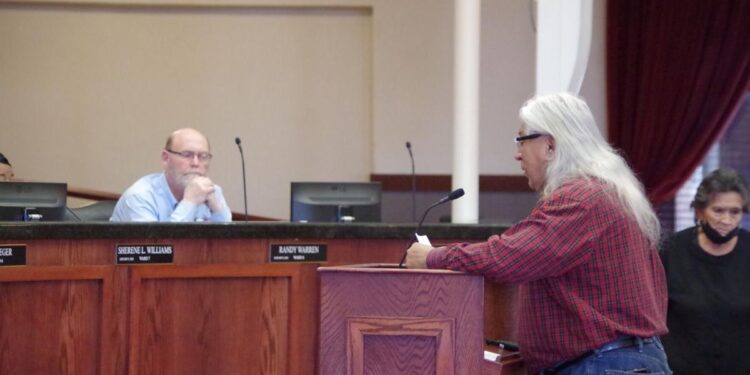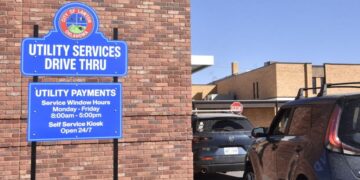Members of the Comanche Nation and others reiterated their opposition Tuesday to the Westwin Elements pilot plant under construction in southwest Lawton.
The speakers made their comments to the City Council during a public comment period at the start of the council’s regular session Tuesday afternoon. There was an item on the council agenda concerning the project — designs for Phase II of water and sewer work — an item the council passed without comment because it was listed on the consent agenda (routine items typically passed without comment).
The City of Lawton is one of the entities involved in what Westwin officials estimate is a $14 million to $16 million project to build a scaled-down version of a cobalt/nickel refinery, which will be the first of its kind in the nation when it is built.
The Comanche Business Committee, that nation’s governing body, approved a resolution Feb. 3 saying it opposes the project for multiple reasons, including health concerns and the plant’s proximity to historic Deyo Mission Cemetery. Committee Vice Chairman Cornel Pewewardy referenced that resolution Tuesday, simply reminding the council the resolution has been passed.
By contrast, resident Greg Effinger loudly criticized the council for ignoring residents who made their opposition evident from the beginning, adding those concerned about health issues “don’t want to be a test subject.”
Effinger said the project doesn’t have control devices, such as third-party air monitoring that would warn residents of a disaster, adding Westwin officials themselves have said there would be leaks, “not if, when.”
Effinger also criticized what he called the secretive nature of the council’s agreement and discussions prior to public votes on the economic incentive package, saying residents should have been part of the process.
“You owe the citizens of Lawton an apology,” he said in a loud voice, adding the council should reverse course. “People over greed.
“We’re not test subjects.”
Geneva Hadley pointed out the number of problems already facing tribal members, criticizing the council for adding health concerns to that list.
“We are here to protect our people and land,” she said, explaining tribal members are working to protect the next generations, as their ancestors did before them. “Please go back to this and research it.”
Anita Paddyaker said at least 14 tribal members live on Red Elk Road, which is close to the refinery site. Those residents already are dealing with health issues stemming from plants already operating in the west industrial park, she said, adding those issues also are affecting animals, water sources and Deyo Mission Cemetery.
Ashey LaMont, national campaigns director for the indigenous people’s environmental protection group Honor the Earth, criticized the council’s decision to decrease public participation. Prior to the meeting, Booker explained the city’s long-standing public comment process, which limits each speaker to 3 minutes and each topic to no more than 9 minutes.
LaMont said tribal participation should have been sought before city officials approved the Westwin agreements, and tribal members are unhappy they were not involved in a decision that is drawing attention from across the nation.
“I want to be very clear: the nation has its eyes on the City of Lawton,” she said, then asked when the city will schedule a public input meeting for those who are just learning about Westwin.
City officials said there have been two public meetings on the Westwin project.
Want to reach a local audience and grow your business?
Our website is the perfect platform to connect with engaged readers in your local area.
Whether you're looking for banner ads, sponsored content, or custom promotions, we can tailor a package to meet your needs.
Contact us today to learn more about advertising opportunities!
CONTACT US NOW




